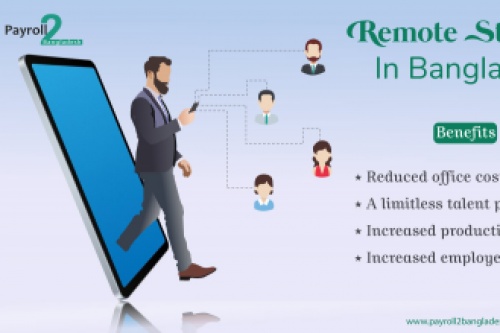HR Policies For Remote Work
Working from home or Remote Staffing creates a different set of advantages and disadvantages. Organizational Learning and Development is dedicated to providing instructors and employees with just-in-time, appropriate materials and support, whether you should be adjusting to leading a team remotely or seeking for approaches and techniques on how to manage your own production during this time.
Research shows that over half of organizations, or 53%, feel that working remotely has improved their readiness to hire freelancers as a response to the Covid-19 epidemic.
Focus Point
1. When compared to in-house employment, remote staffing is just a great approach to grow your team at a much cheaper cost.
2. Having a specialized remote staff allows you to maintain control over your operations, programs, and processes, as well as make adjustments as needed.
3. Remote staff can help firms recruit more effectively by allowing them to hire workers from everywhere in the world.
Approval Process
Individual employees' remote work arrangements can be established, approved, or denied by senior officers. Each remote employee solution should be properly evaluated in advance to ensure that operational requirements and implications are taken into account. Senior officers are advised to offer all acceptable demands careful consideration, but efficacy must take precedence.
Using Remote Staffing Services By Different Types Of Company
Types Of Company
Using Percentage
Small Size Company
55%
Low Medium
43%
Medium
35%
High Medium
28%
Big Company
47%
Eligibility For Remote Staffing
The most important factor to consider when deciding whether or not a remote employee is suitable for a certain worker is not whether the solution fulfills the department's business needs. Not all employees are suited to working remotely. The department's operations and an employee's job function will determine whether or not they are eligible for working remotely. Some work can only be done on-site, and working remotely is not an option.
Remote staffing is frequently better ideal for jobs that require working with equipment that can be readily relocated to a different location.
Remote work may not be suited for jobs that need physical presence or regular interaction with clients and coworkers.
Employees who work from home must be willing to travel when necessary. This includes, regardless of the planned remote staffing schedule, traveling to the primary workplace when necessary.
By shifting loads, generating delays, or adding stages to the process, remote workforce solutions must not have a negative influence on colleagues' workload or productivity.
Guidelines
Employees are required to satisfy the same performance criteria when working remotely since they would when operating on-site.
Based on commercial and operational reasons, teleworking contracts are subject to constant evaluation and may be canceled with 30 days' notice supplied by either party. Because of the department's operational responsibilities, a 30-day notice may not be feasible. Department management may change the notice time accordingly.
The company’s employment terms and conditions remain unaltered. Job responsibilities, performance criteria, attendance requirements, benefits, remuneration, and adherence to UC workforce Rules for Staff Members and organizational policies and procedures are included, but not limited to.
Non-exempt remote employees who work from home must keep meticulous records of their workday start and end hours, as well as food breaks. Non-exempt personnel must also get their managers' permission before working overtime.
Process Of Request
On a case-by-case basis, decisions for remote work are made. When contemplating an employee proposal, operational and business considerations come first.
A. Proposal for Employee Remote Work Arrangements:
1. Employees should write a proposal outlining their goals for timely completion of work and maintaining contact with their supervisor and coworkers.
2. The report should explain how well the remote staffing situation would affect your work, your colleagues' work, and the operations of your department.
3. The employees should set up a meeting with their boss to talk about the suggestion. The contract should be completed if the proposal is authorized.
4. If your request for remote workforce is connected to a health condition or disability, go to Remote Employee Disability Management Solutions for further information and to obtain and fill out an Approval Request form.
5. Use this to request remote staffing and explain your functional restrictions. Download and fill the COVID-19 Adaptation Request Form if you believe you are at an elevated risk of serious sickness from COVID-19 owing to age or an existing medical condition. You will be contacted by a Disability Management Consultant.
The Steps Should You Take To Become A Remote Company?
Moving to a 100% remote workforce is more difficult than it appears, and there will undoubtedly be some growing pains. Let's wrap up this essay with a few pointers on how to make change effective for your company:
1. Maintain a centralized communication hub: The most difficult aspect of having a dispersed remote workforce is keeping everyone connected. For sustaining continuous communication, a service like Chat is a requirement.
2. Make it simple to collaborate and share work: It's difficult for many people to engage on the very same task when they aren't in the same room. It's doable, thanks to collaboration technologies like Google Docs.
3. Plan for medical insurance and taxes: Employees in different states and countries have varied insurance and taxation needs, so plan accordingly.
4. Regularly host all-hands meetings: When it comes to company objectives and news, remote staffing are frequently left in the dark. Make sure you hold meetings on a weekly or quarterly basis to keep everyone up to date.
5. Is it possible to aim for a local time overlap?: Some remote employees require staff to work in the same time zone. It's not required, but it's worth considering for jobs where you'll be working closely with others on a regular basis.
Conclusion
Employers must strike the proper balance including in and remote workers in order to maximize their company's efficiency. It's become the norm to embrace new remote work trends. Providing workplace flexibility and flexibility for your employees. will provide you with a strategic edge over other employers. We are here to help you if you need our employer Of Record (EOR) Services.
https://www.payroll2bangladesh.com/blog/eor/remote-work-guidelines-for-employee/
















